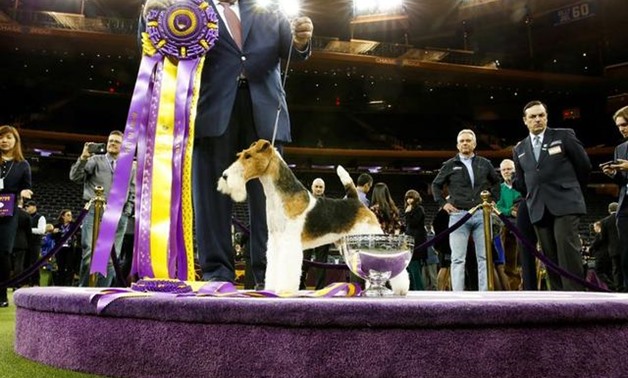
Puppies and older pooches face tough odds to win Westminster glory
NEW YORK (Reuters) - By his species’ standards, King was middle-aged last year when he beat out hundreds of younger, tail-wagging contestants to win the most esteemed title in the land of pedigrees - Westminster Kennel Club’s “Best in Show.”
But the Wire Fox terrier, two years older than the average age of winners over the past decade and eligible for the American Kennel Club’s “veteran” classification, never looked better than when he won the alpha prize of dog shows at age 7 years and 4 months.
“I would rather show an older dog, a mature dog like that, because they’re more steady and more dependable,” King’s handler, Gabriel Rangel, said in an interview.
Dogs between the ages of 3 and 6 are most likely to win the coveted prize because they have lived long enough to have gained show experience and maturity but have not yet passed their physical prime, animal behaviorists and show experts said.
The “Best in Show” competitors are groomed from birth. But they must be full-grown to compete because they are judged on their physical conformation to their breed’s prototype, down to the very inch.
Most breeds reach physical maturity between ages 1 and 2. They usually need at least another year to “campaign,” or attend weekly dog shows to establish their reputation, before entering the big leagues.
The 144th Westminster Kennel Club’s show, the second-oldest U.S. sporting event behind the Kentucky Derby horse race, is set to begin this weekend and culminate on Tuesday with the Best in Show contest at New York’s Madison Square Garden.
“You’re not going to see anyone younger than 2. I would be surprised,” said Rangel, who has handled three Westminster best-in-show winners.
Laund Loyalty of Bellhaven, a collie, was the youngest pup to win Best in Show at the age of 9 months in 1928. The oldest was Stump, a 10-year-old Sussex Spaniel who weathered a life-threatening illness and emerged from retirement to win in 2009.
The process of building clout on the competitive show circuit requires more time than training for the conformation contest, where dogs complete tasks like walking alongside their handler (“heeling”) and standing perfectly still (“stacking”).
“That’s not very hard to train. It’s not rocket science,” said Nicholas Dodman, co-founder of the Center for Canine Behavior Studies. “It’s really just about reaching the peak of your adulthood and not going past the age where there are diminishing returns.”
There is no standard retirement age for champion canines, but handlers say dogs eventually start to lose the gleam in their coat and the skip in their step.
“Dogs tell you when it’s time,” Rangel said. “You can see a decline in their attitude.”
For many looking to end long, successful careers on a high note, Westminster is often the place to do it, said Bill McFadden, who handled the best-in-show winner in 2018, a Bichon Frise named Flynn.
“That’s just kind of a tradition,” McFadden said. “Dogs that have had a good career, they’ll end it at Westminster.”

Comments
Leave a Comment